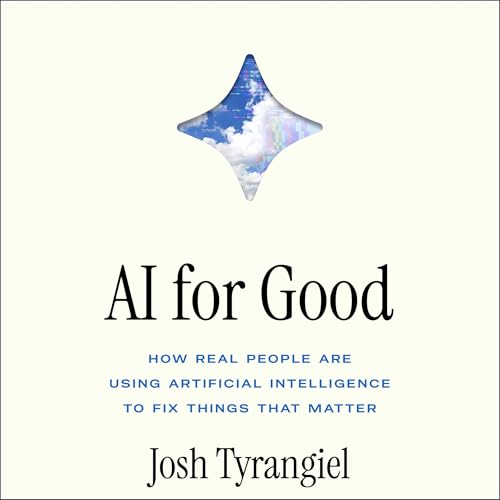
AI For Good
How Real People Are Using Artificial Intelligence to Fix Things That Matter
Échec de l'ajout au panier.
Veuillez réessayer plus tard
Échec de l'ajout à la liste d'envies.
Veuillez réessayer plus tard
Échec de la suppression de la liste d’envies.
Veuillez réessayer plus tard
Échec du suivi du balado
Ne plus suivre le balado a échoué
0,00 $ pour vos 30 premiers jours
OFFRE D'UNE DURÉE LIMITÉE
Obtenez 3 mois à 0,99 $ par mois + 20 $ de crédit Audible
L'offre prend fin le 1 décembre 2025 à 23 h 59, HP.
Abonnez-vous à Audible pour 0,99 $/mois pendant les 3 premiers mois et obtenez un crédit de 20 $ en prime sur Audible.ca. La notification de crédit sera envoyée par courriel.
1 nouveauté ou titre populaire à choisir chaque mois – ce titre vous appartiendra.
L'écoute illimitée des milliers de livres audio, de balados et de titres originaux inclus.
L'abonnement se renouvelle automatiquement au tarif de 0,99 $/mois pendant 3 mois, et au tarif de 14,95 $/mois ensuite. Annulation possible à tout moment.
Choisissez 1 livre audio par mois dans notre incomparable catalogue.
Écoutez à volonté des milliers de livres audio, de livres originaux et de balados.
L'abonnement Premium Plus se renouvelle automatiquement au tarif de 14,95 $/mois + taxes applicables après 30 jours. Annulation possible à tout moment.
Précommander pour 19,29 $
-
Narrateur(s):
-
Auteur(s):
-
Josh Tyrangiel
À propos de cet audio
AI is often framed as a force of radical transformation, either catapulting us into a utopian future or dragging us toward existential ruin. But this book tells a different story. It’s not about high-profile tech CEOs who want to use AI to “break shit,” but about a bunch of smart pragmatists using AI to make the world better.
Josh Tyrangiel’s journey into AI began with a late-night YouTube video featuring General Gustave Perna, the retired four-star general who orchestrated the distribution of Covid vaccines during Operation Warp Speed. Perna’s success—and the end of the pandemic—depended on AI’s practical ability to synthesize and standardize vast amounts of logistical data. AI wasn’t the hero of the story—it was the tool that helped real people get things done.
This book follows those people, who make up a kind of AI counterculture. It explores AI’s quiet revolution in government services, medicine, education, and human connection—places where it’s being used to amplify human judgment rather than replace it. It tells the stories of teachers, doctors, and bureaucrats who often stumbled into AI as a means to solve specific, tangible problems, often with no prior software expertise.
While the loudest voices in AI debate doomsday scenarios and trillion-dollar market opportunities, this book focuses on those working in the messy, incremental, but deeply impactful space of AI practice. However, there is one big caveat—success is not guaranteed. Change is hard. Institutions move slowly. But even in failure there are lessons for everyone who’s interested in using AI—carefully, thoughtfully—to build a better world today.
Pas encore de commentaire


